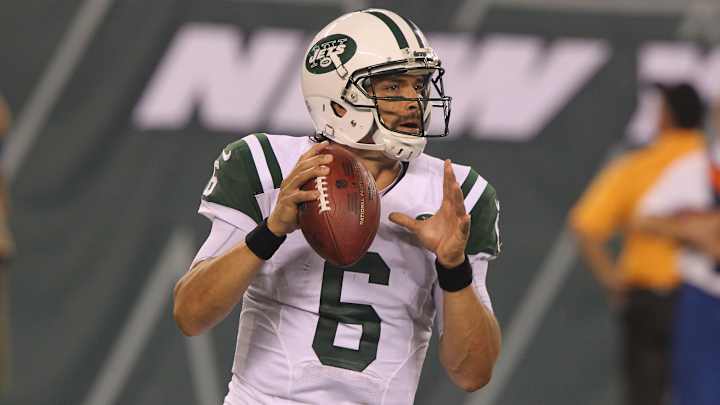Mark Sanchez’s Career Deserves More Than to Be Defined by One Play

Mark Sanchez is joining ESPN as a broadcaster, ending an NFL career that people probably assume they can sum up in two words, even if that isn’t true.
The thing about the butt fumble (which has its own Wikipedia page, by the way) is that it was past the end of any reasonable expectation that Sanchez would grow into a decades-long face of the franchise. That possibility, however encouraging during two straight trips to the AFC Championship game, had washed away during the post-2010 free agency spending spree, the long-term signing of Santonio Holmes and the ill-fated experimentation with a Tim Tebow package that would vaporize any chance of normalcy for a once-promising career. If anything, it was a postscript in an instructional on how to overhype, overheat and overload your top draft choice.
Sanchez arrived in a firestorm, one of many momentary—and intense—obsessions of new head coach Rex Ryan. Ryan’s vision for a team was big and bold, and contained many high-priced veterans, some of whom took pay cuts to join up with the person then believed to be the best players’ coach in the business. In that way, Sanchez was like a singer plucked out of the music conservatory and asked to keep Led Zeppelin together. He was, after only one 13-game season in college, a good-looking 23-year-old with a city begging to crown him the next Joe Namath nipping at his heels. He did magazine photo shoots. He was asked to answer questions in English and Spanish; to be both a veteran quarterback and polished marketing product. Despite this, Sanchez seemed to constantly vacillate between coddled superstar and resented afterthought, with little time to find comfort as just the starting quarterback. The team famously made an ill-fated flirtation with signing Peyton Manning in 2012, before Manning eventually chose the Denver Broncos.
I think there is a different world in which Sanchez is still around, maybe not as a full-time starter but as a high-priced veteran backup. He came at a time not only of great turbulence in New York, but in a kind of dead zone for drafted quarterbacks. This was before the great hey, let’s incorporate some of what they already do well revolution of the later 2000s. Sanchez worked with Brian Schottenheimer, then the late Tony Sparano. By the time Marty Mornhinweg had arrived in 2013, Sanchez was in a battle with Geno Smith, inserted deep into a meaningless preseason game against the Giants, which led to a busted shoulder and lost season.
From there, the damage was done, but it’s hard to ignore what Sanchez was able to do when he was comfortable and supported. The playoff run in 2010—in which the Jets beat both Peyton Manning and Tom Brady in subsequent weeks to reach the AFC title game—included two games that saw him produce quarterback ratings over 100, and multiple touchdowns with no interceptions. For his career, Sanchez was 4-2 in the postseason, with an average quarterback rating of 94.3. His brilliant back-shoulder fade to Braylon Edwards, with less than 30 seconds to go, down two against the Colts on the road, was one of the better playoff throws I’ve seen from any quarterback given the circumstances.
Of course, it’s easier to box Sanchez’s career into one gaffe. Lord knows, after that roller-coaster ride in New York, he was able to build the kind of humility and self-deprecating humor that was necessary to deflect something that personally destructive. The more difficult mental exercise would be considering what might have happened if the team didn’t shed complementary pieces, valued possession receivers and stalwart offensive linemen.

Conor Orr is a senior writer for Sports Illustrated, where he covers the NFL and cohosts the MMQB Podcast. Orr has been covering the NFL for more than a decade and is a member of the Pro Football Writers of America. His work has been published in The Best American Sports Writing book series and he previously worked for The Newark Star-Ledger and NFL Media. Orr is an avid runner and youth sports coach who lives in New Jersey with his wife, two children and a loving terrier named Ernie.
Follow ConorOrr